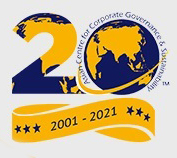Directors Power Breakfast Series 2001™
Corporate Governance increasingly become a crucial issue the world over for quite some years. In Asia, it has assumed more importance recently. In India a proper Corporate Governance code is in place since December 1999, after the Kumar Mangalam Birla Committee report was accepted by Securities Exchange Board of India (SEBI).
In order to provide the Directors of Indian Companies, an opportunity to interact with the industry leaders, Chairmen & MDs of some of the ‘Better Governed Companies’, Asian Centre for Corporate Governance launched Director’s Power Breakfast Series-2001.
Directors Power Breakfast Series 2001 proved to be very valuable as the themes concerning the specific needs of Indian boards, were discussed over ten breakfast meetings spread over the entire year 2001. The series was inaugurated on 14th March 2001. Participation to this series was essentially by invitation and restricted to Chairmen/ MDs and board members only. Power breakfast meetings were held at a fixed venue & on a fixed day, from 8 am to 9.45 am on 2nd Wednesday of every month
Themes for Director’s Power Breakfast Series 2002™ - Mumbai
| Name of the Speaker | Theme | Date (Decending Order) |
|---|---|---|
Ms Lalita GupteJt. Managing Director, ICICI. | “The Board’s Role In Strategic Planning Process” | August 12th December 2001, 2002 |
Mr. Deepak M. Satwalekar Managing Director, HDFC Standard Life Insurance Co. | “How to lead an Effective Audit Committee Meeting” | 23rd Nov,2001 |
R. Gopalakrishnan Executive Director, Tata Sons | “Issues in implementation of good Corporate Governance principles in Indian Boards” | 10th October 2001 |
Homi Khusrokhan Managing Director, Tata Tea Ltd. | “Making Corporate Governance a way of life” | 10th Sep 2001 |
Humayun Dhanrajgir Former Managing Director, Kodak (I) Ltd. | “Building a Cohesive Board” | 11th July 2001 |
Roberto F. De Ocampo President, Asian Institute of management, Philippines (I) Ltd. | “CEO’s Role in Board Leadership” | 29th June 2001 |
Ashok Advani Chairman & CEO, Blue Star Ltd. | “Building a High Performing Board” | 13th June 2001 |
Debabrata Bhadury Vice Chairman, Hoechst Marion Roussel Ltd. | “The CEO, Board and Shareholder Relationship Challenge” | 9th May 2001 |
R. H. Patil Former MD,National Stock Exchange S. A. Dave Former Chairman UTI. | “Changing Role & Responsibility of Nominee Directors” | 11th April 2001 |
Minoo Shroff Vice Chairman, Raymond Ltd.. | “Role of Board in Entrepreneurial Company” | 14th March 2001 |
10th Director PowerBreakfast Meeting
The Board’s Role In Strategic Planning Process
By
Ms. Lalita Gupte – Joint Managing Director, ICICI Limited
December 18th, 2001, Mumbai
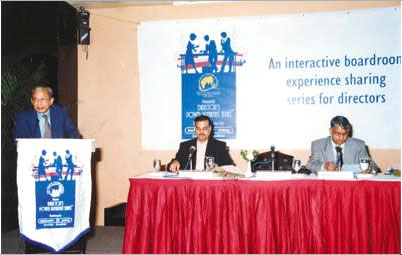
Ms. Lalita Gupte, Very few Indian Companies treat Boards as a strategic resource in the true sense, as a result the boards of these companies miss out on the wealth of wisdom and rich experience of the Independent Directors. Recognising the crucial need of involving Independent Directors in the Strategic Planning Process, Asian Centre for Corporate Governance & Mahendra & Young Knowledge Foundation organised, the Tenth Director’s Power Breakfast Meeting on December 18th, 2001 on the theme “The Board’s Role in Strategic Planning Process” by Ms. Lalita Gupte, Joint Managing Director, ICICI Ltd.
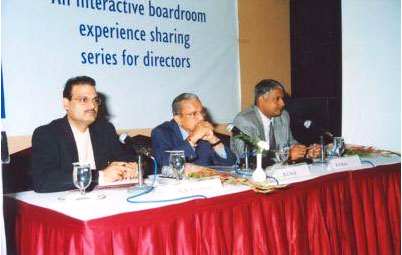
The participants and the Panel of the 10th Director’s Power Breakfast Meeting comprised of a good mix of Independent Directors from Multinational as well as large Indian Companies, senior people from Financial Institutions and Scions of Family Owned Business families of India. Mr. Shekhar Bajaj, Chairman & Managing Director, Bajaj Electricals Ltd. shared his views on how family managed companies should manage the ‘migration path’ from family control to professionalisation by separating management and ownership.
9th Director Power Breakfast Meeting
How to lead an effective Audit Committee Meeting
By
Mr. Deepak Satvalekar – Managing Director, HDFC Standard Life Insurance.
November 28th, 2001, Mumbai
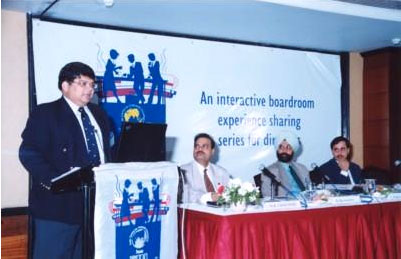
Audit Committee is one of the most important Board Committees and has been made mandatory by Securities and Exchange Board of India. SEBI stipulates that the Audit Committee should be chaired and comprise of majority of Independent Directors (Non-executive Directors). There has been some ambiguity on the scope and role of the Audit Committee amongst the Directors of the Indian Corporate World. With the objective of addressing this knowledge gap, Asian Centre for Corporate Governance and Mahendra & Young Knowledge Foundation organised, the Ninth Director’s Power Breakfast Meeting on November 28th 2001, on the theme “How to lead an Effective Audit Committee”, which was addressed by Mr. Deepak Satwalekar, Managing Director, HDFC Standard Life Insurance Ltd. and Chairman-Audit Committee, Infosys Technologies Ltd. The meeting generated a good amount of interactions, wherein Industry bigwigs like Mr. N.B.Godrej, Mr. Ashwin Dani, Mr. Mathew Cadbury, Mr. Nabankur Gupta, Mr. Minoo Shroff … and the list goes on…. contributed very richly by discussing & even debating certain issues pertaining to Audit Committee.
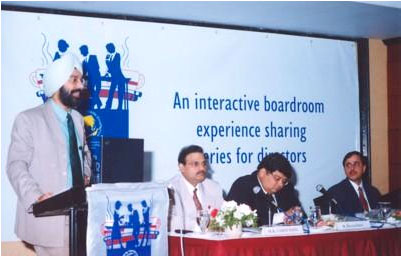
Mr. Deepak Satvalekar-Managing Director, HDFC Standard Life Insurance is addressing the high powered audience on “How to lead an effective Audit Committee Meeting” on 28th November, 2001. Sitting on the dias are Mr.M.K.Chouhan, Chairman -Mahendra & Young Knowledge Foundation and Vice-Chairman, Global Advisory Board, ACCG with Ms.Tarjani Vakil, Former Managing Director, Exim Bank.
8th Director Power Breakfast Meeting
Implementing good Corporate Governance Principles in Indian Companies through
The Concept of Committee Of Directors (COD)
By
Mr. R. Gopalakrishnan – Executive Director, Tata Sons Limited
October 10th, 2001, Mumbai
Mr. R. Gopalakrishnan, has experience with Tata Group, which is one of India’s largest corporate entity, having nearly eighty companies in it’s fold. He also has experience of sitting on the boards of some of the large MNCs like Hindustan Lever Limited (member of Unilever Group UK) and ICI Limited. He described an interesting paradox that, a CEO says, “give me a good board and I will the take company to greater heights”. While the Board members say, “give us a bright CEO & we will ensure ‘value maximisation’ for shareholders through good governanc”e. Therefore it is a chicken & egg situation because there is no such thing as an ‘ideal Board’ or ‘an ideal CEO’. Under such circumstances, he feels, Committee Of Directors (COD), is one of the effective ways of implementing good Corporate Governance practices. He discussed 4 live cases where COD gave very valuable inputs to the CEO. He described how Committee Of Directors (COD) examined the proposal of a project involving huge investment in a particular company and provided much required counsel to the CEO because in their judgement it was not the right decision. Thereby protected the shareholder’s interests. eventually governance of the company improved.
Mr. R. Gopalakrishnan – Executive Director – Tata Sons, addressing 8th Director Power Breakfast Other Panelists in the picture are (L-R); 1. Mr.M.K.Chouhan – Chairman, Mahendra & Young Knowledge Foundation 2. Mr.Minoo Shroff – Vice Chairman, Raymond Limited.
7th Director Power Breakfast Meeting
Making Corporate Governance a way of Life
By
Mr. Homi Khushrokhan – Managing Director, Tata Tea Limited.
September 10th, 2001, Mumbai
The responsibility of ensuring the regulatory compliance on Corporate Governance primarily lies with the Board & CEO. But the organisations who believe that in the context of Corporate Governance, “spirit” is more important than the ‘letter’ and ‘Substance’ is more important than the ‘Form’ are the ones who go beyond the ‘Checklist management’ required by the regulators. This precisely was the subject matter of the Power breakfast meeting addressed by Mr. Homi Khushrokhan – Managing Director, Tata Tea Limited. He spoke on the theme “Making Corporate Governance a way of Life”. A panel discussion followed the presentation of Mr. Khushrokhan. The group felt that those companies who develop a culture of ‘transparency & accountability’ through out the organisation, are the ones who will bring ‘value maximisation’ for the share holders. The companies who do not take Corporate Governance as a way of Life, only pay lip service to Corporate Governance.
Mr. Homi Khushrokhan-Managing Director, Tata Tea is addressing the 7th Directors Power Breakfast Meeting Other panelists seen in the picture (L-R) are Mr.M.K.Chouhan - Chairman, Mahendra & Young Knowledge Foundation & Mr.Humayun Dhanrajgir – Former MD Kodak (I) Ltd.
6th Director Power Breakfast Meeting
Building of a Cohesive Board
By
Mr. Humayun Dhanrajgir – Former Executive Vice Chairman, Glaxo (I) Ltd.
July 11, 2001, Mumbai
Cohesiveness in the board is almost as important as the ‘Balance’ & ‘Fit’ which were discussed in the earlier power breakfast meeting. Mr. Humayun Dhanrajgir – Former Executive Vice Chairman, Glaxo (I) Ltd. & Former Managing Director, Kodak (I) Ltd, brought out this aspect very well as the speaker for the Power Breakfast meeting on July 11, 2001 at the Mayfair Rooms, Worli, Mumbai-25 on “Building of a Cohesive Board”. There was a panel discussion on the same theme. The Panelists were; Mr. M.K. Chouhan – Chairman, Mahendra & Young Knowledge Foundation & Member Global Advisory Board ofAsian Centre for Corporate Governance™ (ACCG), made a presentation on “Barriers to good Corporate Governance” Dr Ram Tarneja - Former MD, Bennett Coleman & Company Mr. V. Thyagarajan – Vice Chairman & MD of Glaxo (I) Ltd. as well as Mr. K.H. Mankad, Finance Director BSES, made some very interesting points during the discussion. The conclusion was that, it is necessary to have cohesion because a cohesive board brings strength to the non-executive group. It means solidarity, it means unity, it also means harmony and this does not mean that there is no place for dissent, obviously there could be constructive dissent. Without constructive dissent no board can be really effective because Independent Directors are generally, very free to express their views on issues of great importance to the company.
Mr. Humayun Dhanrajgir seen addressing the 6th Director Power Breakfast Meeting on 11th July 2001. Other panelist in the picture are Mr. M.K. Chouhan Chairman - Mahendra & Young Knowledge Foundation. & Dr.Tarneja – Former M D banelt Coleman (I) Ltd.
5th Director Power Breakfast Meeting
Role of CEO in Board Leadership
By
Mr. Roberto F. De Ocampo – President, Asian Institute of Management, Philippines, Manila,
June 29th, 2001 Mumbai
Asian Centre for Corporate Governance™ (ACCG), organised its fifth Director’s Power Breakfast meet on June 29, 2001 at the Mayfair Rooms, Worli, Mumbai-25. Mr. Roberto F.De Ocampo – President, Asian Institute of Management, Philippines, Manila, was the speaker for the Power Breakfast meeting. He spoke on “Role of CEO in Board Leadership” Mr. M.K.Chouhan – Chairman, Mahendra & Young Knowledge Foundation & Member Global Advisory Board of Asian Centre for Corporate Governance™ (ACCG), made a presentation on “Health of the Board” based on parameters like FIT, Balance & Competitiveness.
Mr. Robert F.De Ocampo, President of Asian Institute of Management, Manilla addressing the Directors Power Breakfast Meeting on 29th July, 2001. Seen on the dias are Mr. H. Dhanrajgir, Mr. M.K. Chouhan, Dr. Ram Tarneja and Mr. K.K. Nohria, Mr. Ocampo spoke on the theme “CEOs Role in Board Leadership”. There was a panel discussion on the same theme, the Panelists were; 1. Dr. Ram Tarneja - Former MD, Bennett Coleman & Company 2. Mr. Humayun Dhanrajgir - Former MD, Kodak India Ltd. 3. Mr. K. K. Nohria - Chairman, Crompton Greaves Mr. Ocampo summed up Role of CEO in Board Leadership beautifully as follows. “Beset on all sides by competitors both foreign and local, threatened by a shift in the market because of technological changes and deluged with information from traditional media and the Internet, the CEO of today must feel more and more like a commander on the hilltop overlooking a battle field that is constantly shifting, rather than as a general plotting on a distant board surrounded by his or her commanders.”
4th Director Power Breakfast Meeting
Building of a High Performing Board
By
Mr. Ashok Advani – Chairman, Blue Star Ltd
June 13, 2001 Mumbai
Composition of board is extremely important for the success of a company. The fine combination of ‘Balance’ & ‘FIT’ of the board is of essence in building a high performing board. Mr. Ashok Advani – Chairman, Blue Star Ltd, a large engineering company which is a leader in capital goods & refrigeration, was the speaker for the Power Breakfast meeting on 13th June 2001. He spoke on“Building of a High Performing Board” There was a panel discussion on the same theme, the Panelists were; 1. Mr.M.K. Chouhan – Chairman, Mahendra & Young Knowledge Foundation & Member Global Advisory Board, Asian Centre for Corporate Governance (ACCG), made a presentation on eight steps to Recruitment of independent Directors. 2. Dr Ram Tarneja – Former MD, Bennett Coleman & Company 3. Mr. Minoo Shroff – Vice Chairman, Raymond Ltd. The group felt that there is no such thing as an ideal board. While individually each director could be very intelligent & bright but ultimately it is the collective wisdom of the board, which is most important. It is the skill of the Chairman to leverage each board member’s strength, which makes a ‘high performing board’.
Mr.Ashok Advani’ Chairman Blue Star Ltd. addressing the Director’s Power Breakfast meeting on 13th June, 2001 seen on the dias are (L-R) Mr. M.K. Chouhan – Chairman, Mahendra & Young Knowledge Foundation & Member Global Advisory Board, Asian Centre for Corporate Governance™ (ACCG), Mr.Minoo Shroff, – Vice Chairman, Raymond Ltd and Dr. Ram Tarneja- Former MD, Bennet Coleman & Company. Mr.Ashok Advani spoke on the theme “Building a High Performing Board”.
3rdDirector Power Breakfast Meeting
CEO, Board and the Shareholder Relationship Challenge
By
Mr. Debabrata Bhadury – Former Vice-Chairman of Hoechst Marion Rousel Ltd.
May 9th, 2001 Mumbai
CEO, Board and the Shareholder Relationship Challenge was the theme for the Power Breakfast meeting, on 9th May 2001 at the Mayfair Rooms, Worli, Mumbai. Mr Debabrata Bhadury, who has a very long and rich experience as CEO of HMR, a Pharmaceutical MNC shared his insights & his personal experience on how he himself faced this challenge for so many years in HMR. There was a panel discussion on the same theme, the Panelists were; Mr. S. M. Trehan – Managing Director, Crompton Greaves Ltd. Mr. K D. Shah -Managing Director, Fulford (India) Ltd. and Mr. M. K. Chouhan – Chairman, Mahendra & Young Knowledge Foundation & Member Global Advisory Board, Asian Centre for Corporate Governance™ (ACCG), The interactive series lasted for 1 hour after breakfast and generated very interesting ideas. The group felt that the role of CEO in managing growth of company is very crucial. He has to strike a fine balance and manage the relationship between he board as well as shareholders. The CEO, should consider the board members as a strategic resource and must engage them in free & frank discussion. The suggestions of independent directors could be extremely valuable for the designing the strategy for the whole time management team. Independent directors by virtue of their rich experience on several other boards can bring fresh perspective to the thinking of the CEO & the management team. The group also felt that managing the relationship with the shareholders is yet another challenge for the CEO, which is even more crucial. CEO is the custodian of the funds of shareholders, maximising the value for shareholders is one of the primary responsibilities of CEO. The group opined that the companies which are high on transparency & accountability are rewarded by shareholders & investors handsomely and thus will never have dearth of funding for new projects.
At the occasion of the Third Power Breakfast Series of the Director’s Power Breakfast Series 2001™, seen on the dais are (L to R) Mr. M.K. Chouhan, Chairman Mahendra & Young Knowledge Foundation & Convenor & Member Global Advisory Board, Mr. Debrata Bhadury, Former Vice Chairman, Hoechst Marion Roussel Ltd., Mr. K.D.Shah, President & MD Fulford India Ltd., Mr. S.M.Trehan, MD, Crompton Greaves Ltd.
2ndDirector Power Breakfast Meeting
Changing Role & Responsibilities of Nominee Directors
By
Mr. S. A. Dave – Former Chairman of Unit Trust of India (UTI) and
Dr. R. H. Patil - Former Managing Director of National Stock Exchange (NSE)
11th April, 2001 Mumbai
Indian boards have a unique feature of having “Nominee Directors”, which is not seen in any other Asian, American or European boards. These nominee directors are nominated by Indian Financial Institutions (FIs), who have extended large term loans to these companies. In order to protect their interests, FIs have a clause in the loan agreement, which entitles them to nominate a director on the board of the company. For several years some of these nominee directors have been playing a rather passive role on the boards. Asian Centre for Corporate Governance (ACCG) felt that, considering the recent changes in the Indian capital market & regulatory frame work of companies on one side and incidents of some financial scams on the other, the changing role of these nominee directors needs to be discusses freely. Thus Former Chairman of India’s largest FI, UTI, and Former Managing Director of National Stock Exchange (NSE), Mr. S. A. Dave - Former Chairman of Unit Trust of India (UTI) and Dr. R. H. Patil - Former Managing Director of National Stock Exchange (NSE) were invited to be the speakers for the second Power Breakfast meeting, on 11th April 2001 at the Mayfair Rooms, Worli, Mumbai. The Panelists were; Mr. M. K. Chouhan - Chairman, Mahendra & Young Knowledge Foundation & Member Global Advisory Board, Asian Centre for Corporate Governance (ACCG), Mr. K.G. Vassal - Executive Director, Unit Trust of India Mr. P.H. Lele - Chairman, Parke Davis India Limited.
At the occasion of Second Power Breakfast of the Director’s Power Breakfast Series 2001™, seen on the dais are (L to R) Mr. K.G. Vassal, Executive Director, Unit Trust of India, Mr. M.K. Chouhan, Chairman Mahendra & Young Knowledge Foundation & Convenor & Member Global Advisory Board, Dr. S.A. Dave, Former Chairman-Unit Trust of India and Mr. P.H. Lele, Chairman & MD-Parke Davis Ltd. Mr. S.A. Dave, Former Chairman of UTI said that the Nominee Directors have great Fiduciary responsibilities as ‘Trustees’. He added that there are 3 principles, which govern the Roles & Responsibilities of Nominee Directors 1. Prudence 2. Duty of loyalty to Shareholders 3. Diversification. Dr. R.H. Patil – Former MD of National Stock Exchange said ‘let us privatise the private sector‘. The Institutional Holdings is increasing world over. In the US it is 50 – 55 %, while in UK it is 75 %. Thus the Nominee Director of FIs have a very large responsibility of protecting interests of minority shareholders. In India the promoter families feel that the company belongs to them, thus when there is a split in the family the company also gets split or divided. In such situations it is the FIs Nominee Directors, who take a prudent stand and come to the rescue of the company; Dr. Patil added. Mr. K.G. Vassal – Executive Director UTI – felt that self-governance and self-regulation is the best mode for the companies and India has to go a long way in this direction. Mr. Lele – Chairman, Parke Davis and Warner Lambert, a Mutinational Pharmaceutical company, felt that the Corporate Governance principles of transparency and accountability are not only meant for the corporates, they should equally apply to all other constituents like the government and other regulatory bodies. The Nominee Directors of large FIs, should not be influenced by government in the decision making. When they sit on the boards of a particular company, they should be free to use their judgement and act in the best interest of the company without any interference. The Power Breakfast meeting was attended by 35 high powered Chairmen, Managing Directors, CEOs and Board Level People. These people also made rich contributions during the interactive session. The group felt that since the environment within which today’s businesses are operating has undergone tremendous changes the Nominee Directors should play their role accordingly. There is a debate going on in India on the issue that whether Financial Institutions (FIs) should at all have nominee Directors on the Boards of Companies. Regardless of the outcome of this debate, the group felt that, the nominee directors while participating in the board meetings should only have the larger interest of the company in mind and not view the situations from the narrow perspective of their respective FI only. The group also felt that there should be an orientation program for new as well as present directors so that they can upgrade their knowledge on changing legal & fiduciary responsibilities of directors.
Dr. R.H. Patil, Former MD – National Stock Exchange, seen addressing the High Powered participants at the Second Power Breakfast meeting, on the theme “Changing Role & Responsibilities of the Nominee Directors”. Seen on the dais are (L to R) Mr. K.G. Vassal, Executive Director, Unit Trust of India, Mr. M.K. Chouhan, Chairman Mahendra & Young Knowledge Foundation, Convenor & Member – Global Advisory Board and Dr. S.A. Dave, Former Chairman – Unit Trust of India.
Inaugral Director’s Power Breakfast Meeting
Innauguration of Asian Centre for Corporate Governance™ (ACCG) &
Directors Power Breakfast Series 2001™ (DPBS)
14th March, 2001, Mumbai.
Asian Centre for Corporate Governance™ (ACCG), as well as Directors Power Breakfast Series 2001™ (DPBS), were inaugurated on 14th March, 2001, Mumbai by Mr. Minoo Shroff – Vice Chairman, Raymond India Ltd. and a noted economist.“Asian Centre for Corporate Governance™ (ACCG) has been promoted with a mission “To promote Global Corporate Governance principles of Transparency, Accountability & Equity". ACCG will aim to become a “Catalytic Institution” to bring about qualitative improvements in the Corporate Governance ‘Processes & Practices’ of Asian Companies for optimising the shareholder’s as well as stakeholder’s value, in a balanced manner.” Directors Power Breakfast Series 2001™ (DPBS), which is a unique initiative in the area of Corporate Governance, was also launched on the same day. DPBS is an interactive boardroom experience sharing series for directors. Important board issues and the challenges facing Indian boards will be discussed at these DPBS meetings once a month over breakfast, for the entire year 2001. The inaugural lecture was on “Role of Board in the Entrepreneurial Organisation” by Mr. Minoo Shroff, which was followed by a panel discussion on the same theme. The panelists were : 1. Dr. Ram Tarneja – Former MD Times of India Group 2. Mr. Humayun Dhanrajgir – Former MD Kodak India Ltd. 3. Mr. K.K.Nohria – Chairman, Crompton Greaves Ltd. 4. Mr. M.K.Chouhan – Chairman, Mahendra & Young Knowledge Foundation and Member-Global Advisory Board of Asian Centre for Corporative Governance.
dpbs-2001-pic12 Mr. Humayun Dhanrajgir, Former M.D., Kodak India Ltd Seen lighting the lamp at the occasion of the inaugration of the Asian Centre for Corporate Governance™ & the Director’s Power Breakfast Series 2001™. To his right are Dr. Ram Tarneja, Former M.D., Bennett Coleman & Co. Ltd., Mr. Minoo Shroff, Vice-Chairman, Raymond Ltd., And Mr. M.K. Chouhan, Chairman, Mahendra & Young Knowledge Foundation, Convenor & Member of Global Advisory Board. The audience comprised of 35 High Powered Chairman, Vice-Chairman, MDs, and Directors of various companies. The interactive series lasted for 1 hour after breakfast and generated very interesting ideas. ACCG aims to work very closely with various stakeholders like; Company Boards, including Promoters / Owners, Independent Directors as well as Management Team of Whole Time Directors of the Asian Companies. Individuals as well as Institutional Investors (FIIs) Regulatory & Developmental authorities like Department of Company Affairs, Securities & Exchange Boards, Central Banks and Stock exchanges etc. of Asian Countries. Since majority of companies in India are family owned & managed, it was befitting to start the DPBS with a theme like “Role of Board in the Entrepreneurial Organisation”. The take away of the day was that it is possible to separate ‘management’ from ‘control’. Thus, Indian companies need to manage a migration path from family managed organisations to professionally managed organisations. Induction of professional independent Directors on boards does not mean loss of control for owner family. On the contrary, it is in the long-term interest of the company as a whole.
